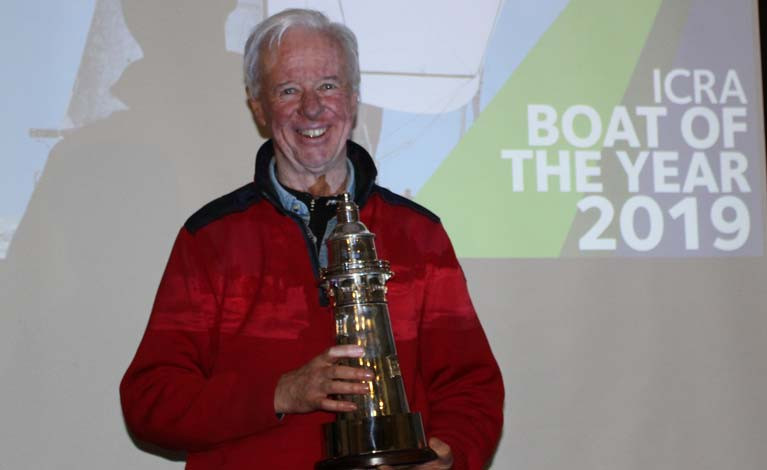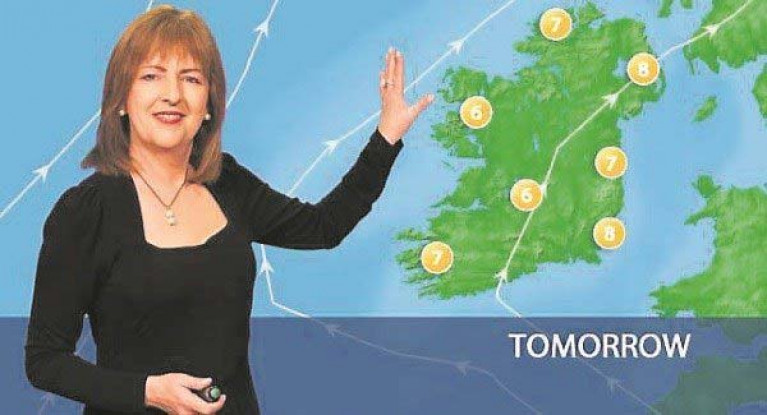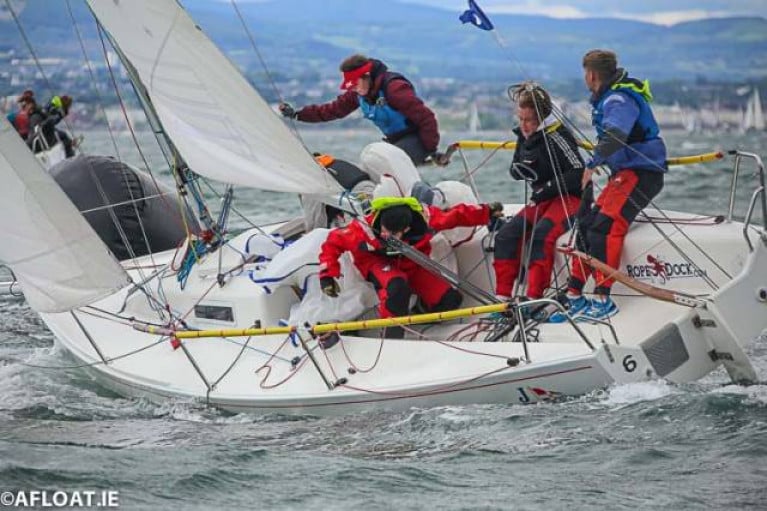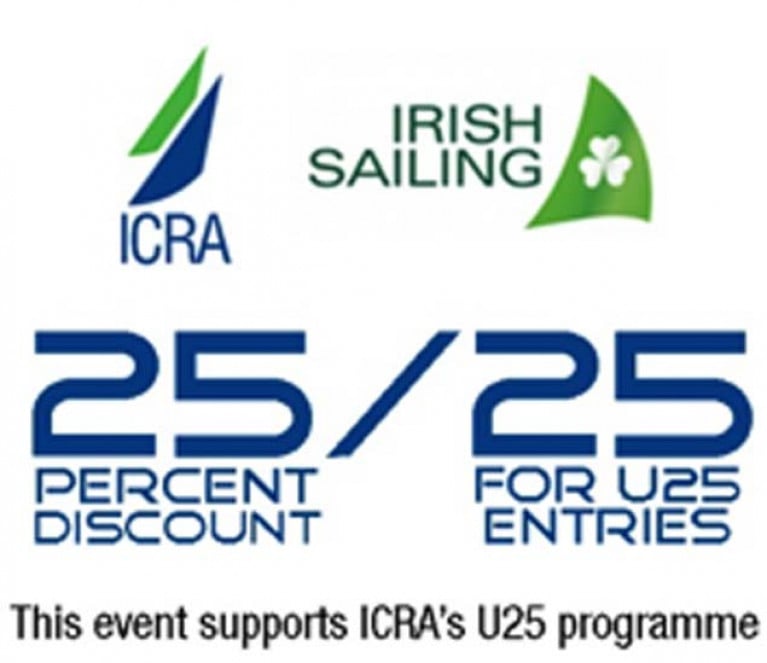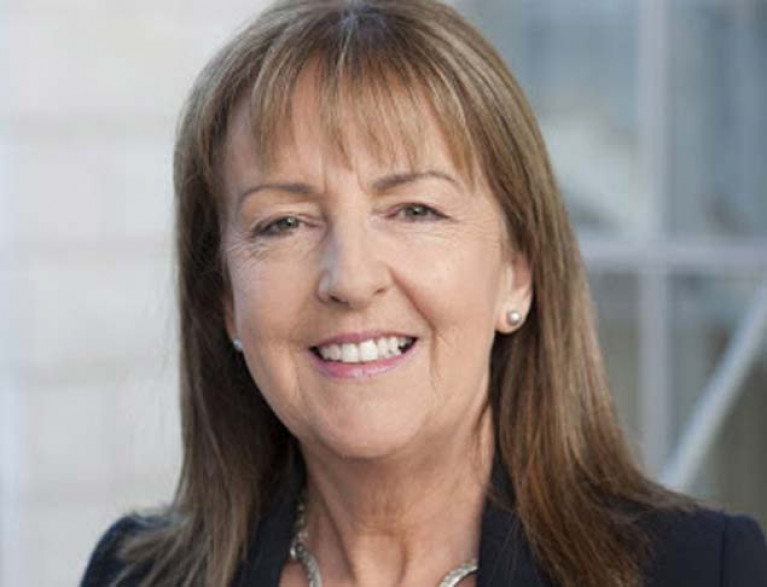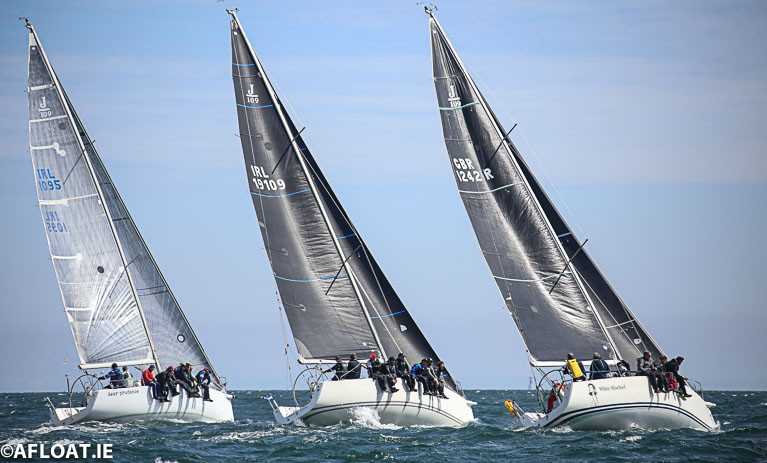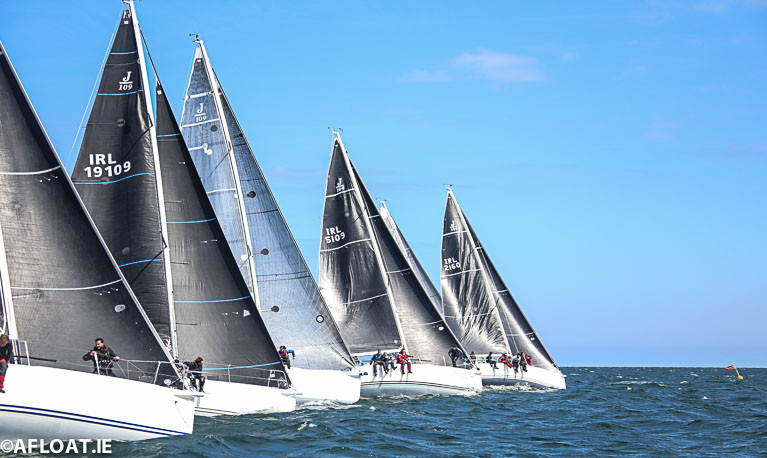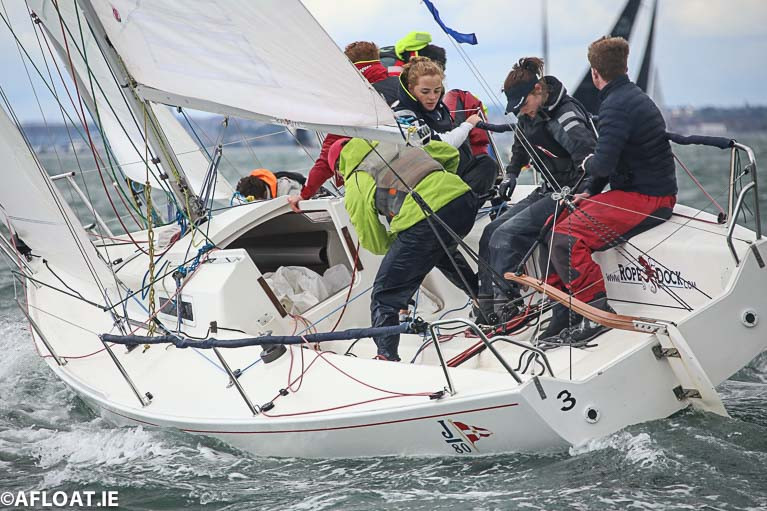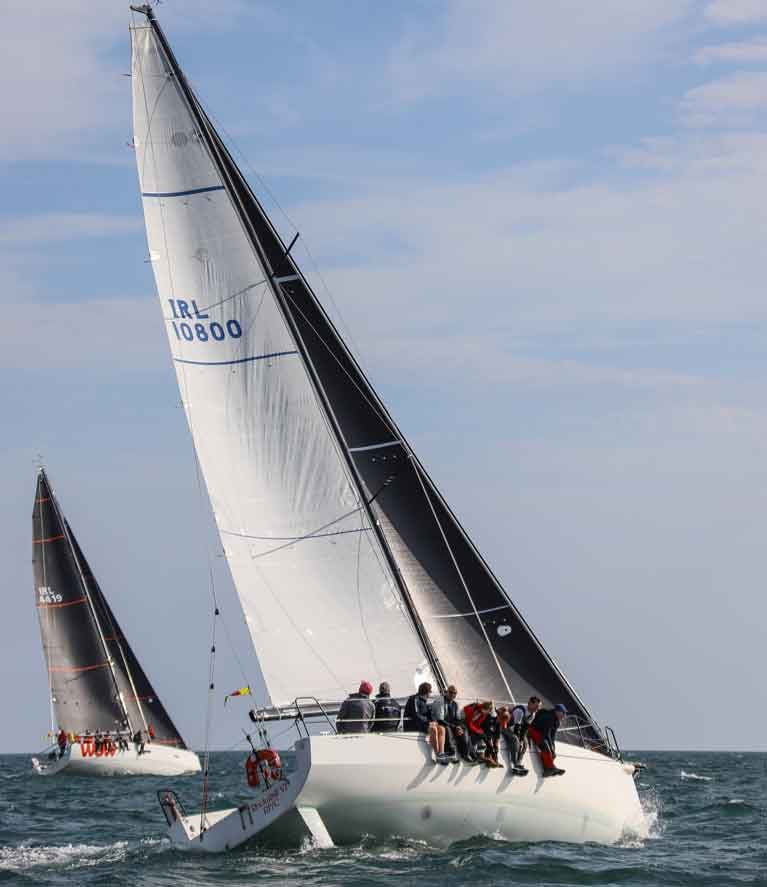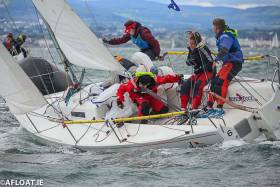Displaying items by tag: ICRA
ICRA Cooks Up its Own Storm at Saturday’s Annual Conference at Royal Irish Yacht Club
While Storm Jorge put a dent in the number of attendees at ICRA's annual conference including Evelyn Cusack being able to attend, a vibrant gathering of over 50 sailors attended the Royal Irish Yacht Club.
Following an introduction by Commodore Richard Colwell, several presentations were made including those from UK Sailmakers Ireland's Barry Hayes and Maurice O’Connell of North Sails. Further presentations were made by WAVE Regatta, Cork Week 300 and Round Ireland 2020.
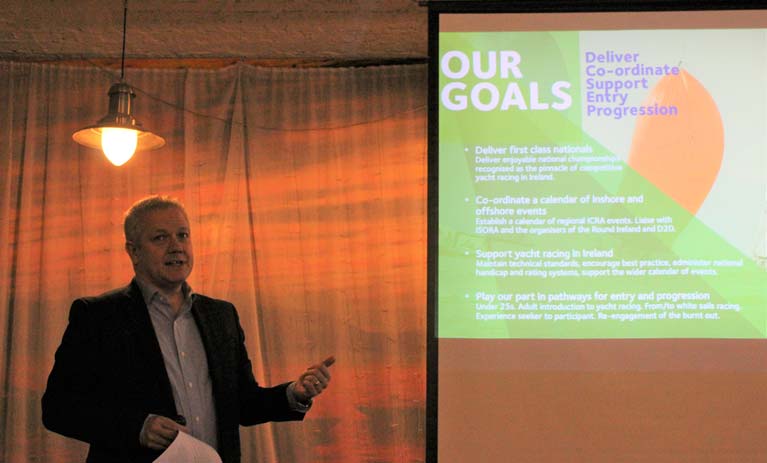 Commodore Richard Colwell opened the ICRA conference
Commodore Richard Colwell opened the ICRA conference
David Cullen hosted a forum that concentrated on policing the ICRA Rule and this provoked an interesting discussion that concluded inspections of boats should become more regular at regattas.
Brian Raftery had a great update on the progress of the Under 25 initiative that has caught the imagination of the youth from several Clubs with campaigns already emerging. Tadg O’Lionsigh of Tralee Bay guided the attendees through his own campaign from rebuilding a battered J24 to hitting the water at speed.
RCYC Admiral Colin Morehead accompanied by Kieran O’Connell and Roscoe Deasy outlined the big changes being made for Cork Week. The decision to allow boats rating greater than 0.980 to participate in both ICRA and the IRC Europeans was welcomed by all, meaning the new formula ICRA event means boats will be scored for Monday, Tuesday, Thursday and Friday whilst Wednesday will be a totally standalone Harbour Race spectacular.
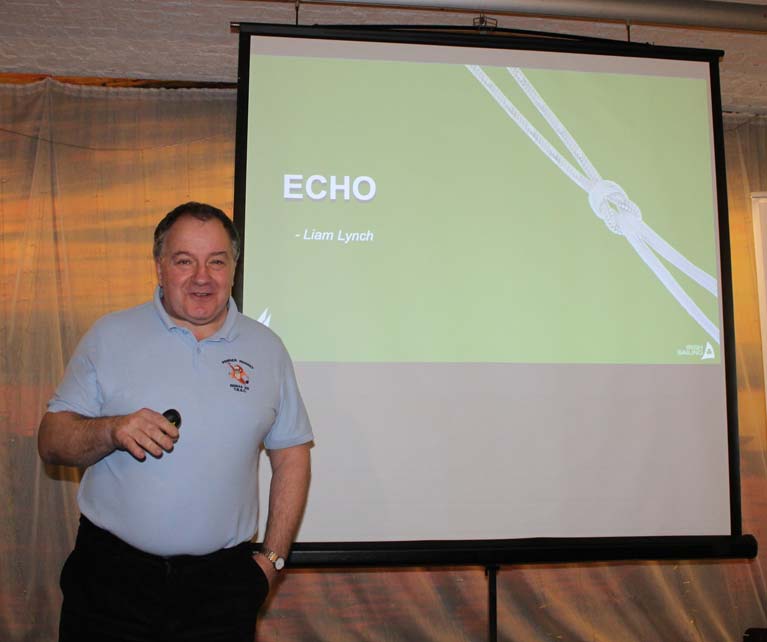 Tralee Bay’s Liam Lynch provided an update on ICRA’s new Progressive Echo handicap system
Tralee Bay’s Liam Lynch provided an update on ICRA’s new Progressive Echo handicap system
The outstanding presentation of the day came from ICRA Committee member and Tralee Bay Sailing Club Commodore Liam Lynch. Liam personally reformulated the ECHO system in 2019 and recapped on the success of this new formula that had been adopted for the major 2019 regattas. He demonstrated that the new formula used produced significantly different results from the previous ECHO formula. It is intended that the new system is adopted for all major Irish regattas in 2020 and this will ensure that all yachts will have a real chance of podium results at whatever they attend.
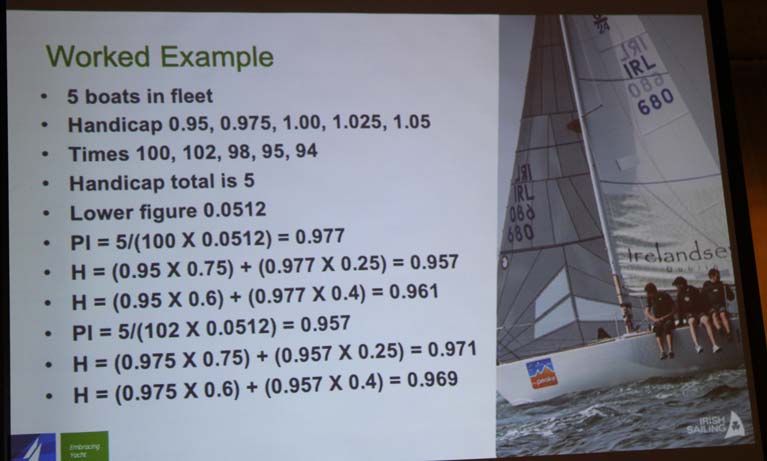
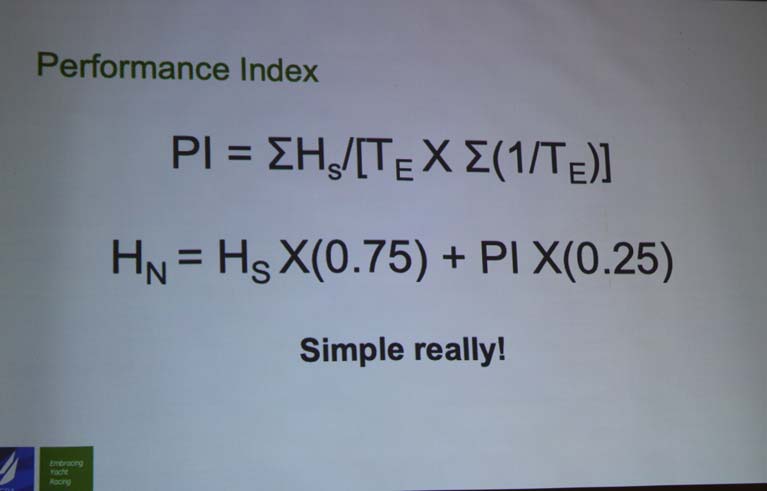
Commodore Richard Colwell commended Liam for his hard work and enthused over the fact that yachts that had previously been excluded from getting prizes now had a real chance of winning if they sailed well. The attendees hugely welcomed this new initiative which will bring more cruiser racers to regattas and increase participation and enjoyment by all.
Colwell also announced that the 2021 ICRAs will be held in the National Yacht Club on Dublin Bay while Dave Cullen outlined the events that would contribute points towards the 2020 Boat of the Year award, details of which can be found at www.cruiserracing.ie.
The day wound up with the presentation of the Boat of the Year Trophy to Paul O’Higgins and crew on Rockabill VI.
Eye on the Storm at ICRA Conference & AGM at Royal Irish Yacht Club
You’d like the absolute one hundred per cent top-level insider information on what gives with the approaching Storm Jorge? Well, unless things conspire to such total destructiveness that she has to be at her command post 24/7 as Jorge sweeps in close past Ireland tomorrow, Evelyn Cusack - the face of Met Eireann - is the lead speaker at the Annual Conference of the Irish Cruiser Racing Association in the Royal Irish Yacht Club tomorrow.
It gets underway at the civilised but prompt time of 1100hrs as the attendance – already upwards of 80 have registered, and it’s expected to easily top the hundred mark on the day – is coming from all over lreland. They'll hear Commodore Richard Colwell and his team review a successful year, and go through the programme for 2020. However, the country’s favourite Weather Woman is scheduled to be the opening speaker at 11 am in a comprehensive programme covering an extensive range of additional informative topics, including Sailmaker/Trainers and the progress with the Under 25 Teams, which is one of the jewels in the crown of ICRA achievement.
There’ll be further details revealed of ICRA-related events, and a Forum will be included to allow members to gives their views and float ideas on how the Association can be progressed, while the formula for choosing the Boat of the Year 2020 will be outlined and analysed.
In all, it will be an intense highly-focused gathering, and for those needing sustenance for a spot of in-conference grazing, the good news is that coffee, tea and scones will be available in the club from 10.30 am, while more substantial lunch arrangements can be made with the RIYC Catering Office.
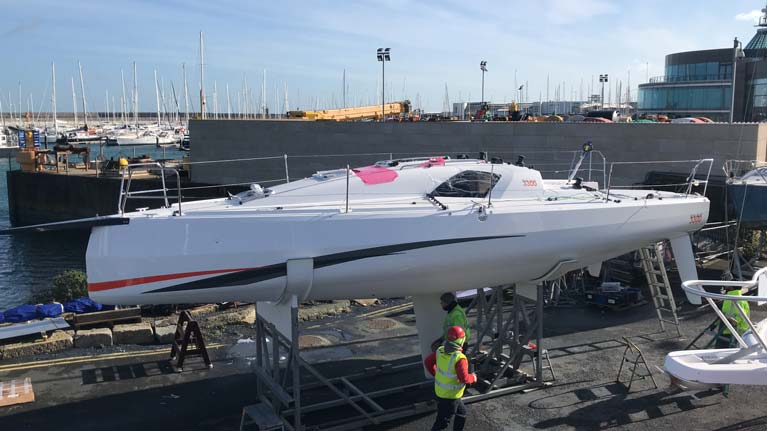 The MGM Sunfast 3300 has arrived in Dun Laoghaire
The MGM Sunfast 3300 has arrived in Dun Laoghaire
As for a spot of associated interest, while the intriguing Sun Fast 3300 newly delivered to Ireland is still being commissioned at the MGM yard just along the waterfront, you might manage to contrive a quick look-see. And if you’re interested in an alternative boat which may be the pioneering Olympic Offshore Racer selected for the 2024 Games, Andrew Algeo’s new J/99 will be in the immediate neighbourhood.
ICRA's Bid to Close Sailing's Losing Gap
Amongst my most pleasant memories of sailing are racing my Sigma 33 in whitesail across Cork Harbour with a crew of four all under the age of 15. I had ‘managerial supervision’ to ensure no untoward happenings for Scribbler, but there wasn’t any need for concern. The four Topper dinghy sailors revelled in handling Scribbler and she responded, showing her stern to several boats crewed by older, more mature sailors. The young lads helmed, trimmed main and jib and finished in the top three across the line.
My belief is that encouraging young sailors into keelboats is essential for the future of sailing, because so many are lost to the sport in that gap between dinghy and cruiser sailing. The young sailors who crewed Scribbler then and have since, some from time-to-time, others permanently on the crew, are still all dinghy sailing. Other owners in the Royal Cork have also encouraged younger sailors to crew on their boats. The club’s Under 25 Academy has developed positively and there are plans to widen the participant age group.
The Irish Cruiser Racing Association’s development of its Under 25 programme, funded by itself and the national sailing organisation, Irish Sailing, is a much-needed and positive national step in closing what has been sailing’s ‘losing gap’.
So this week on my podcast I’m talking to Brian Raftery who has put a lot of work into devising this programme.
The “sailing population” is ageing, of that there is no doubt. So this project, which is intended to solve one of the biggest problems for the sport, is of vital importance.
Brian tells me how the project is developing, the response to it from clubs around the country and how he hopes it will evolve.
Listen to the podcast below
ICRA Launches Under 25 Discount Initiative
Building on the new ICRA / Irish Sailing U25 Support Programme, we are now pleased to announce the launch of our 25/25 scheme writes Dave Cullen of ICRA
To support the existing and newly formed U25 squads around the country, we are asking all Event Organising Authorities and Clubs around the country to offer a 25% discount on your entry fees to all U25 squads entering your events.
Supporting events will have the above logo on their race documents to quickly make competitors aware they are supporting U25 sailors and offering this 25% discount on entry fees.
The following events have already committed to offering this discount;
- Cork300 Cork Week – Royal Cork Yacht Club
- Wave Regatta – Howth Yacht Club
- WIORA Championships – Tralee Bay Sailing Club
- J24 Northerns – Carrickfergus Boat Club
- J24 Westerns – Sligo Yacht Club
- J24 Southerns – Foynes Yacht Club
- J24 Nationals – Howth Yacht Club
ICRA and Irish Sailing greatly appreciate all the above clubs and events for leading the way on this initiative.
We are working on adding more exciting 25/25 discounts very soon.
Any event or business interested in supporting the 25/25 scheme by offering the discount and carrying our logo, simply email [email protected]
Evelyn Cusack (Head of Forecasting, Met Eireann) heads up an exciting and interesting line up of speakers at the 2020 Irish Cruiser Racer National Conference (ICRA) National Conference this month writes ICRA Commodore, Richard Colwell.
This year the conference will be held on Saturday 29th Feb at the Royal Irish Yacht Club, Dublin. It will start at 11 am and has great content all day.
The 2020 Annual Conference will feature:
- Evelyn Cusack (Head of Forecasting, Met Eireann) - we are delighted to have Evelyn Cusack kick-off the conference covering the topic of “Weather Forecasting”, a critical element of all sailing activities and competitions.
- Sailmakers/Trainers – we will have training presentations on tactics and trimming tips learnt throughout the year from training session across many cruiser fleets.
- Under 25 Team – bringing us the detail of how they went about putting together an under 25 team to challenge and win at the J24 National championships
- Major Event Reps – giving you the low down on what to expect at the major cruiser racing coastal and offshore sailing events of the year
- Sailors Forum – giving members a chance to have their views and input heard on relevant topics and discussions for the cruiser racing community.
- ICRA Updates – on the Boat of the Year event for 2020, ECHO handicaps, and the Under 25 Programme.
The full agenda can be found here.
The conference will start in the morning at 11.00 am and will be followed by the AGM and the Boat of the Year Award presentation.
Notice of AGM
All members invited to attend the ICRA AGM which will take place in the Royal Irish Yacht Club in the afternoon of the Saturday, February 29th. Updates of the activities undertaken during the period will be presented by members of the committee and will be followed by the vote for a new Executive Committee.
Changes to the Irish Cruiser Racing Association Rule Book for 2020
Some small changes have been made to the ICRA general rules following a successful first season under its new revamped committee and constitution.
Overall the objective of the General Rules remains the same; to help race organisers keep their documentation simple while helping competitors by keeping the detail consistent from event to event. Much of the rules remain the same with changes representing an evolution based on learning's from the 2019 season.
The statement of the fundamental principles of seamanship has been updated to bring it fully into line with the requirements of the main IRC events.
The 'confusing' use of the term ‘ICRA classes’ has been changed to ‘standard groupings’. A mechanism for reassigning boats between divisions and carrying over scores has been added.
Minimum requirements for safety equipment have been added. Again these standardize the requirements already in place at national IRC events.
Using the number of boats in a division to decide overall prizes can be seen as somewhat arbitrary. A means of calculating an Overall Score using the previous years Boat of the Year scores to assess the competitiveness of each division is provided.
Read more here
ICRA 2020 Conference at Royal Irish Yacht Club in February
The Royal Irish Yacht Club will host the ICRA Annual Conference on Saturday 29th of February.
The conference will include a mix of guest speakers, presentations and discussions on current issues and technical aspects of cruiser racing in Ireland.
The conference will be followed by the Annual General Meeting, which will include an update on matters of importance to the association and the election of members of the executive.
More details here
ICRA 'Overwhelmed' By Response to Under-25 Programme Initiative
The Irish Cruiser Racing Association (ICRA) says it has been 'overwhelmed' by the response it has received to its new Under 25 Support Programme.
The application period ended at midnight on the 19th December and is now closed for 2020.
As Afloat reported previously, ICRA is aiming to encourage young sailors to stay active in the sport and to foster their continued commitment as members of clubs. A programme has been devised by clubs to encourage and deliver a pathway from dinghy to cruiser racing.
Over the next three years, ICRA will deliver support funding that will provide successful applicant clubs with an initial Capital Grant that will help them buy a keelboat for their U25 squad. The scheme will then continue to provide an annual allowance to assist the same clubs to run their U25 programme until it is well established.
"The cruiser-racer body also received expressions of interest, from another ten clubs"
ICRA’s Brian Raftery who is overseeing this initiative has received applications from nine existing programmes at Rush, Malahide, Foynes, Tralee, Sligo, Howth, Baltimore and two Dun Laoghaire clubs. The cruiser-racer body also received expressions of interest, from another ten clubs including Lough Swilly, Mullaghmore, Greystones, Clifden, Westport, Kinsale, Kilrush, Crookhaven, Royal Cork and the Royal Irish Yacht club in Dun Laoghaire, all wishing to start new U25 programmes during the next season.
Brian commented “It is great to see so much enthusiasm across the sailing community to build structured programmes to keep our young adult sailors active in our sport. We will have a busy January, meeting with each of the clubs that have applied for support in 2020, before a final evaluation of applications takes place during February.”
ICRA Boat of the Year 2020 Details Released
The Irish Cruiser Racer Association (ICRA) has issued the Notice of Race for its Boat of the Year (BOTY) Award.
With the ICRA Nationals being hosted by Cork Week in 2020, Calves Week has been added to the events, on the BOTY schedule in order to balance WAVE Regatta, which will be held again by Howth Yacht Club in 2020 at the start of June on the east coast.
At approximately 180 miles the return of the Dún Laoghaire to Cóbh race, feeding into Cork Week, is recognised by ICRA as a national event.
To ensure all boats have an equal chance at winning the trophy will be based on each boats best four results across the events specified in the NOR.
Download the NOR below
ICRA U25 Sailing Support Programme Deadline is Approaching!
For clubs considering establishing an ICRA Under-25 sailing programme and clubs with existing U25 programmes, there are only a few days left to submit your “Expression of Interest” or make your “Existing Programme” application to join the ICRA U25 Support Programme.
As Afloat previously reported, ICRA and Irish Sailing are offering this programme directly to sailing clubs across the country.
Over the next three years, ICRA will deliver support funding that will provide successful applicant clubs with an initial Capital Grant that will help them buy a keelboat for their U25 squad. The scheme will then continue to provide an annual allowance to assist the same clubs to run their U25 programme until it is well established.
The closing date for all 2020 supports is the 19th December.
ICRA says it will not accept any Expressions of Interest or Applications for 2020 after this time.
Please visit the here for more information.


























